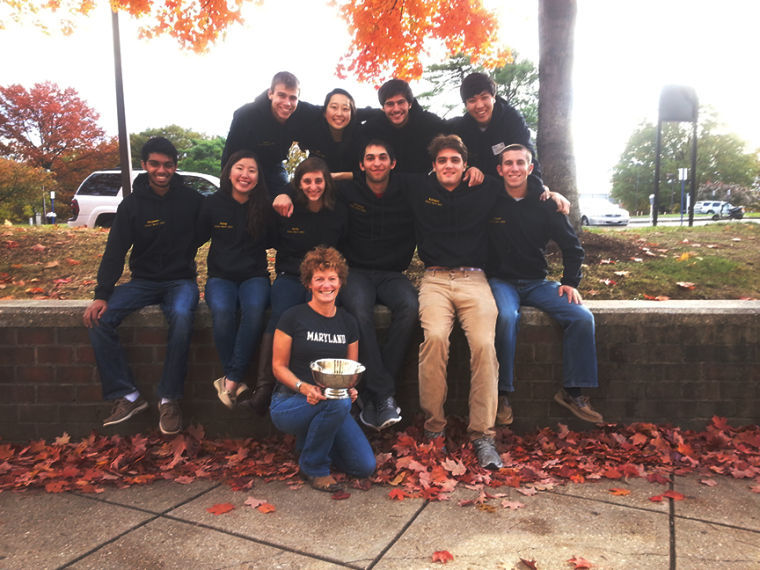
Back Row, L to R: Mickey Hartz; Grace Lee; Billy Mont; Sean Kim Front row: L to R: Mihir Majumdar; Melanie Zheng; AnnaBella Sicilia; Ezra Ellenberg; Luis Rodriguez; Matt Present Kneeling: Prof Susan Dwyer
Controversy struck a rural Virginia town when a local cemetery in Doswell interred the body of Tamerlan Tsarnaev, one of the two Boston Marathon bombing suspects.
Some Massachusetts cemeteries had refused the body, and, due to Tsarnaev’s Muslim beliefs, cremation was not an option. Some Caroline County residents were upset by the decision, while others didn’t care where the bomber’s body went, according to The Boston Globe. This begs the question: What should local leaders do?
This question presented one of 15 cases that this university’s Ethics Bowl team prepared to sweep the winning title at the intercollegiate ethics competition in Baltimore on Saturday.
“It went about as well as we could have asked for,” sophomore journalism major Matt Present said.
Two university teams placed first and second in the competition, with a two-point differential, against teams from the University of Baltimore, the U.S. Naval Academy, Notre Dame of Maryland University and the University of Maryland, Baltimore County.
A typical ethics competition is similar to a debate but with a few key differences.
“Ethics Bowl is more about exploring the ethical issue, taking into account both sides and … evaluating it as a whole,” said senior philosophy major Ezra Ellenberg.
The students received 15 cases to study beforehand, but only one of these cases, chosen at random, is discussed during the competition.
The students on the team present for 10 minutes, then the opposing team gets an opportunity to respond for five minutes. The former team responds again, followed by 10 minutes of questions from the judges. Each team gets a chance to lead and rebut.
“[The judges] look at how well you identify the central ethical issues in the case,” Ellenberg said. “They look at how well you take into account the opposing argument. They also take into account your politeness when it comes to kind of dealing with the other team.”
The teams met weekly to prepare for the competition, said Susan Dwyer, philosophy professor and Ethics Bowl coach. They met for three to five hours a week for six weeks and for 10 hours the week before the bowl.
“You’re not allowed to have any notes with you,” Ellenberg said. “We had to kind of memorize and become very familiar with the entire script of the arguments that we wanted to put forth.”
Dwyer, who formerly trained students for the Ethics Bowl at UMBC, brought the program to this university in 2009.
“College Park didn’t have an Ethics Bowl team, and I thought this was crazy since we were a much bigger school,” said Dwyer. “So I started recruiting people for Ethics Bowl and I’ve been coaching it every fall since I’ve been here.”
Dwyer’s 2011 team went to the national championship.
This year, the Ethics Bowl generated more attention than ever. After advertising to some philosophy classes, Dwyer received about 60 inquiries, and 40 students came to the information meeting. She held tryouts and narrowed a group of 20 down to the 10 students that made up the final Ethics Bowl teams. Dwyer said the teams this year were diverse and included government and politics, journalism, music, philosophy and psychology majors.
Dwyer chose a group of five students to represent the university at the Mid-Atlantic regional competition at Clemson University on Saturday, when they will compete against Clemson, Georgetown and the University of North Carolina, Asheville. If the team places in the top five, they’ll go to the national championship in February.
“We’ve got excellent prospects of certainly making national championship again this year,” Dwyer said. “We’re going to be training very, very hard this week.”
The hard work pays off for students such as Ellenberg, who said he enjoys arguing.
“These are multifaceted cases and they’re interesting to think about,” he said. “I get a lot out of thinking through these problems and discussing it with my teammates.”
Dwyer said she has witnessed students discover a lot about their own intellect, including how quickly they think on their feet and how they rely on one another.
“Just to have this experience of knowing that you can prepare a complex ethical analysis of the case, and then, without notes, get up and talk for 10 minutes about it in a convincing fashion,” Dwyer said, “Nothing boosts your intellectual self-confidence like that.”



